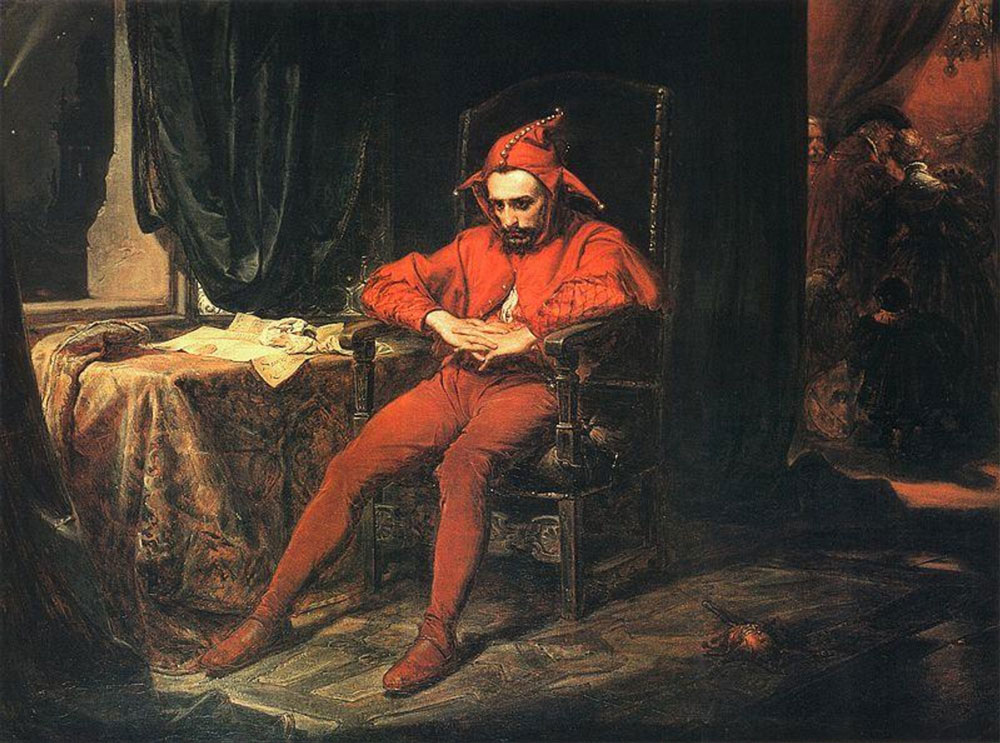I was first exposed to this painting of the noble jester several years ago, and the haunting reality of the portrait has stuck with me ever since. The painting, done in 1862 by Polish painter Jan Matejko, is one of the most famous paintings in the Polish National Museum in Warsaw, both because of the artist's skill and the subject it depicts.
I wrote a secret post while on deployment about my timely discovery of the book "One Flew Over the Cuckoo's Nest" right as I was living in my own personal insane asylum. It's a sad fact that when surrounded by insanity, the most natural reaction in the world is to simply laugh. Unfortunately, when one's entire job is dependent on one's ability to be funny, you can find it pretty emotionally draining to keep a smile on your face when the news of one's daily life continues to get progressively more bleak.
Since I've come back from deployment, I have had a wonderfully positive shift in mood and general restfulness as time has gone on. Nevertheless, like poor Stanczyk, I too have been guilty of putting on a smiling face when inside I feel as if the crushing weight of my realizations overseas will smother the joy right out of me. The world is much uglier than we ever imagined, and sadly I fear that things will only get much, much worse in the future.
The lessons of this painting to me are twofold:
1. The smartest man in the room is rarely the most powerful person. People with power are necessarily expected to have all the answers. Some people even take their powerful position as a sign that their superior intellect and leadership acumen have somehow been "recognized," rather than acknowledge that they may simply be the lucky beneficiary of time and chance. Even a turd will find its way to the top, given enough time. Though Stanczyk was by no means the most powerful person in the Polish court, he has become even more famous in the minds of the Poles than the three Kings he entertained (and even carefully criticized) with his jokes. Sometimes intelligence is its own form of power.
2. Intelligence is a Curse. Whereas the foolish nobles were content to ignore the grave news about the loss of Smolensk (which any student of history will tell you has belonged to the Russians ever since that fateful day in 1514, barring a brief reconquest from 1611-1667), Stanczyk on the other hand immediately realized the implications of what he was reading, and to him it signaled the doom of the Polish Kingdom. From the times of the Russian wars onward, Poland never again enjoyed the hegemony over Eastern Europe that it had had during those heady years before 1514. After that, the Prussians and the Russians on both sides of them began to progressively chip away at their empire, and the Kings and Nobles did little, if anything, to stem the tide as it turned against them. Smart people unfortunately don't have the luxury of burying their heads in the sand when they hear depressing news, which is why many smart people (read: artists, inventors, writers, etc.) have always been of a very melancholy disposition. It's very telling to me that some of the most brilliant writers and artists of the modern era (Van Gogh, Hemmingway, Fitzgerald, Hunter S. Thompson, David Foster Wallace, Kurt Cobain) all succumbed to their inner demons, probably because they realized that at its core, life is a joke; just not a very funny one.

 RSS Feed
RSS Feed